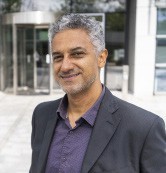RARE DISEASE SOLUTIONS
Rare diseases and exceptional solutions
Antonio Payano, Bayer UK & Ireland CEO, explores the advancements that have been made within the field of rare disease in recent years, touching upon the potential of gene editing and viral delivery strategies

Pharmafile: The advances made in the life sciences in recent years has been dubbed ‘The Bio-Revolution’. What have been the key advancements in rare disease research during this period?
Antonio Payano: The life sciences have made great recent advances. Biology, life sciences, and the megatrend of digitisation, are growing closer together, enabling new inventions that impact our daily lives. We call it the ‘Bio-Revolution’. This revolution is reinforced by rapid increases in computing power, and the emergence of new capabilities in AI, automation, and data analytics. These trends are further accelerating the pace of innovation, and the potential for higher R&D productivity in the life sciences.
All this has led to new ways of understanding and exploring biology. The range of life forms on earth is incredibly complex and diverse. However, the methods of analysing them can be remarkably similar. Technologies and methods are transcending disciplinary boundaries even faster.
The implications across the life sciences can be enormous: for human health, for example, a deeper understanding of the relationship between genetics and disease has led to the emergence of precision medicine, which can potentially be more effective than the one-size-fits-all therapies of the past. In the future, new technologies could help the healthcare industry not only treat, but cure, or even prevent, diseases. New gene and cell therapies, for example, aim to cure genetic diseases, potentially enabling sustainable organ replacement, or reversing autoimmune diseases.
What can you tell us about your journey at Bayer for the past 25 years, preceding your appointment as CEO?
I recently celebrated my quarter-century with Bayer, joining the organisation when Schering was merged with Bayer in 2006 – so I have been reflecting on what a significant milestone it is for me personally and professionally. My current role as Senior Bayer Representative and Country Division Head (Pharma) for Bayer UK & Ireland is a truly natural progression, and I can track the influence that each step and each role has had, leading me to where I am now. For example, after moving to Germany from the Dominican Republic as a child, then starting with my under-graduate studies there, a subsequent scholarship to Stanford, an MS degree from the University of Colorado,
US, and a PhD in Industrial Chemistry at the Technical University Berlin, Germany, while also being engaged in a management trainee programme at Schering, travels around the world started early.
Observing how the industry operates from a young professional’s point of view, and with the perspective of different countries’ modus operandi, I have been able to draw on a depth and breadth of knowledge, through roles encompassing diagnostics (contrast media) during my traineeship: general medicine and specialty therapeutics in the pharmaceutical businesses working in the US, Spain, Peru, Mexico, Czech Republic, and Slovakia; I have also had responsibilities as Business Unit manager; in regional and global assignments and working in the corporate offices of Bayer AG in Leverkusen; being in a Managing Director and Country Division Head role and sub-region Head Pharma EMA (Turkey, Ukraine, North & Central Africa, and Middle East), as well as heading Bayer Pharma’s Global Healthcare Programs group. Through this long and varied experience of Bayer globally, and my connections to our Headquarters in Leverkusen, I aim to bring all the threads together and maximise our opportunities to harness science for the future, using all available technologies. I look forward to seeing the outputs of our Bio-revolution in the next phase of my journey.
What is your long-term vision for Bayer in the area of rare disease treatment/ innovation advancement?
Induced pluripotent stem cell (iPSC) technology, gene editing, and viral delivery strategies are combined at Bayer under its cell and gene therapy platform, which we launched at the end of 2020. The team is enabling the development of innovative treatments to augment regenerative medicine strategies – Bayer scientists are currently looking at gene circuits to formulate iPSCs, which can sense and respond to identified disease markers around them. iPSC-based therapies have potential to change the way we treat the loss of motor controls resulting from the death of neurons that affect dopamine production in Parkinson’s disease, or the regeneration of retinal tissue damaged by macular degeneration. The science is there, and our commitment to it is profound.
Bayer’s LifeHub UK, in partnership with Sensyne Health, focuses on AI imaging solutions to optimise drug discovery. How will this technology help advance research into rare genetic disease?
Our LifeHub UK initiative taps into one of the global challenges in Life Sciences – that is that some problems are too big to tackle alone. Ecosystems boosting the innovation capability of the pharma community and Bayer’s ongoing collaboration with Sensyne Health is an example of how progress in data science can disrupt and uncover solutions. Sensyne Health is partnering with Bayer on developing AI-enabled radiology to enhance patient outcomes, and is also investigating how to accelerate the development of new treatments for cardiovascular disease using clinical AI.
The UK is the third biggest market in the world for AI investments - behind only the US and China – and access to academic talent is extensive, including a quarter of the world’s top 25 universities. The incredible resource that is the NHS also provides the largest single-payer healthcare system in the world, and one which offers the best data granularity, representing an opportunity for AI solutions to optimise drug discovery and disease diagnosis/therapy, and lead the way in advances in healthcare.
How was Bayer’s research impacted by the pandemic?
I would say the pandemic only fuelled Bayer’s commitment and fervour. Our development portfolio of cell and gene therapies already comprises eight advanced assets in different stages of clinical development. These are applicable in multiple therapeutic areas with high unmet need, such as neurodegenerative, neuromuscular, and cardiovascular indications. With over 15 preclinical assets in the cell and gene therapy field, the pipeline is expected to grow steadily year by year, and the pandemic has driven our vision in these fields.
On a less clinical note, it is almost too early to learn lessons from this global pandemic, as we are still in the middle of it. It has presented us with many difficulties, yet, faced by this common challenge, the scientific community has come together in unprecedented ways in the search for solutions. The Bio-Revolution has the potential to help address some of the most critical global challenges, from climate change, to pandemics, chronic diseases, and worldwide food security. Experts estimate that a significant portion of the economic impact of biological applications will be in health care, agriculture, and consumer products.1
What are some of the major challenges in researching and creating treatments for rare genetic diseases?
One of the great challenges in 21st century medicine is to try and reverse the impact of age on the body; age ravages the body – sometimes unfairly so – generating hard-to-treat, or even hard-to-identify, conditions. Wouldn’t it be great to turn back the clock by replacing the damaged cells with new ones? Pluripotent stem cells (PSCs) self-replicate, and have the potential in the human body to develop into almost any cell type. PSCs hold potential in the development of regenerative medicines, but having a readily available supply of PSCs continues to prove challenging for a number of reasons – mainly because they are derived from human cells, an issue identified in the development of COVID-19 adenovirus vectored vaccines using genetically modified human embryonic kidney 293 cells. Science has shown that you can reprogramme adult cells into a pluripotent state – iPSCs – which could be converted into different cell types. Fifteen years on from this scientific discovery, iPSC technology is seen as a potential solution to the major challenges in drug development, in tandem with the ongoing ethical discussions.

Antonio Payano joined Bayer with Schering in 2006, becoming head of the Oncology BU for Bayer/Schering in Spain. He then became head of the Hospital BU, and later head of the BU General Medicine, before becoming General Manager, Bayer Health Care Head and Country Cluster head for Pharma Czech Republic and Slovakia. From Czech Republic, Antonio moved to Bayer’s Headquarters in Leverkusen, Germany, as Head of Regional Co-ordination Europe. Antonio returned to Global Pharma in Berlin to lead the Elevate programme to develop a new go-to-market model, after which he was appointed to lead Bayer’s EMEA Sub-region EMA comprised of Turkey; Ukraine; North and Central Africa, and the Middle East and Bayer Pharma’s Global Healthcare Programs. Antonio completed this role before taking up his current role as CEO Bayer UKI; MD Bayer plc, and CDH Pharma UKI.